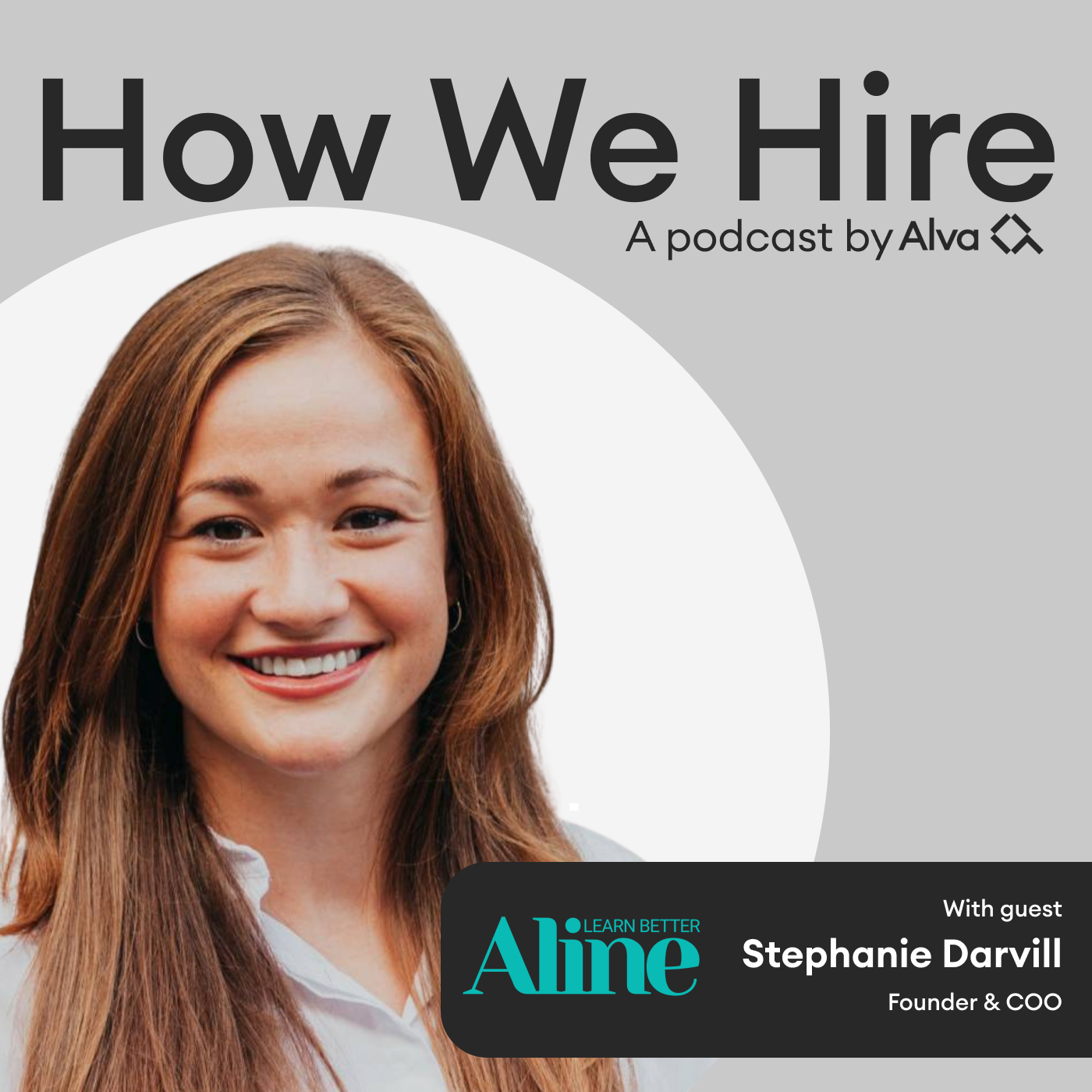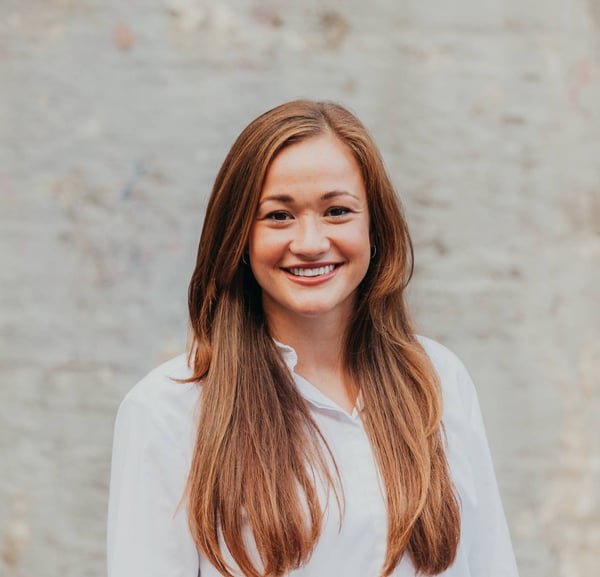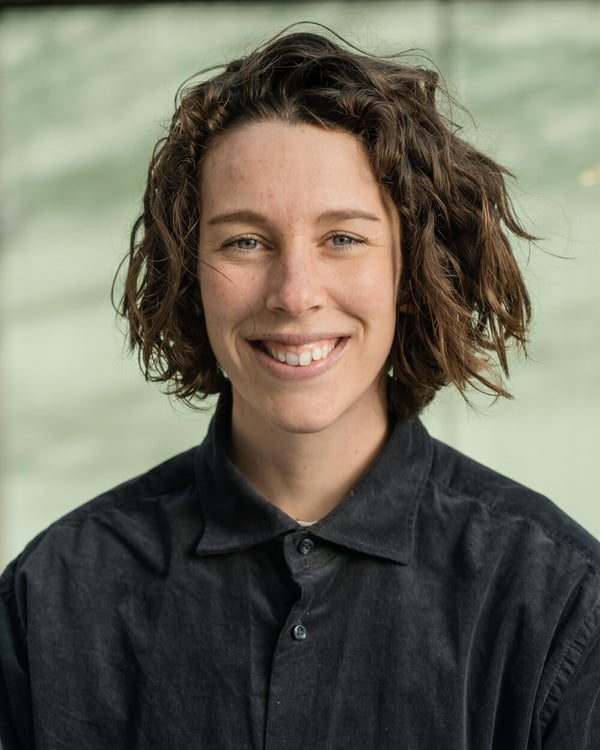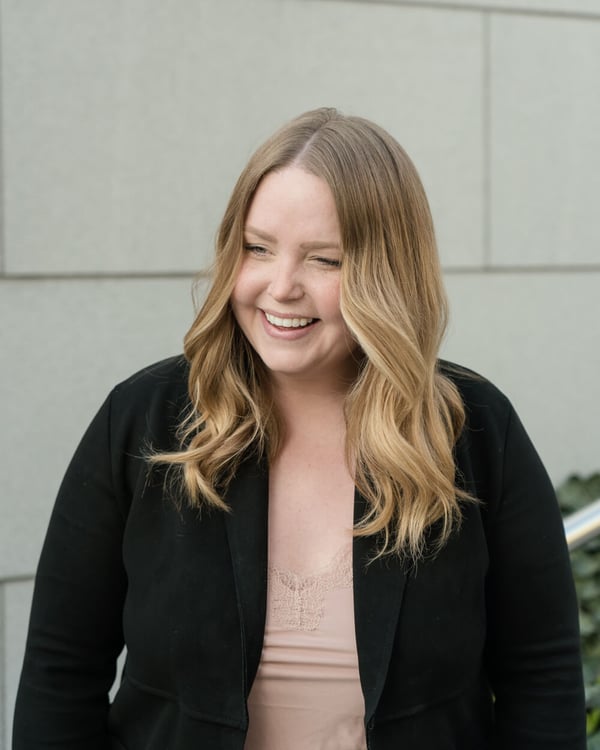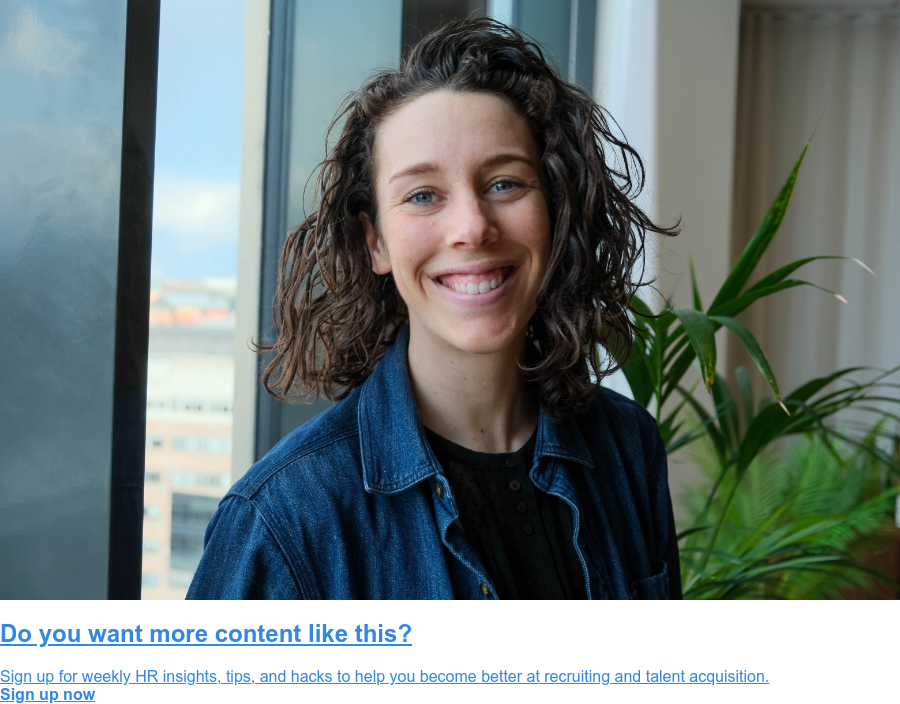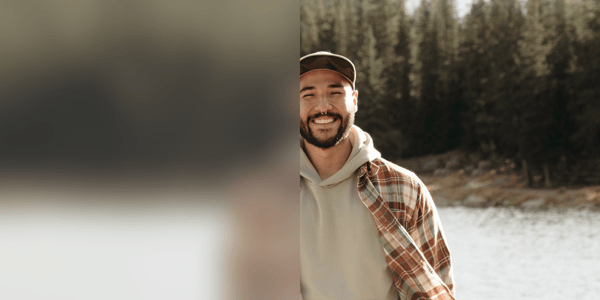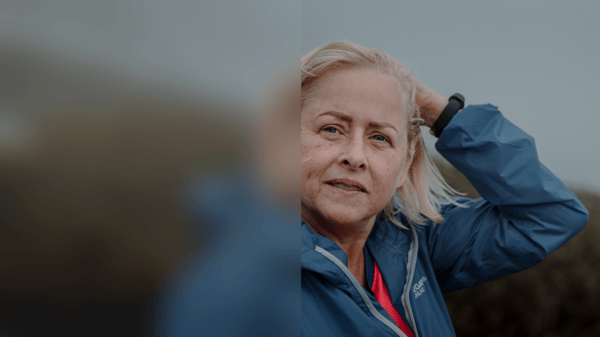Tove Hernlund (00:06): Welcome to How We Hire, a podcast by Alva Labs, with me Tove Hernlund.
Linnea Bywall (00:10): And me, Linnea Bywall.
Tove Hernlund (00:12): This show is for all of you who hire or just find recruitment interesting. Every episode, we will speak the thought leaders from across the globe to learn from their experiences and best practice within hiring, building teams and growing organizations.
Tove Hernlund (00:36): Yay. Today we are guested by Stephanie Darvill. Stephanie, would you like to introduce yourself?
Stephanie Darvill (00:44): Yes. Sure. And thank you for having me. So, I'm Steph Darvill, I'm originally from the UK, but been living in Sweden of about five years now, and I am the co-founder and COO at Aline, which is a learning platform based here in Sweden as well.
Tove Hernlund (01:00): Nice. And what's your focus within your role, obviously, as co-founder you have a lot of focus areas, I'm guessing. But within the line, what is it that you find the most exciting about doing what you do?
Stephanie Darvill (01:11): Yeah. Often it's more what I don't do rather I do deal with. Being a co-founder, I don't do the developing, that's my wonderful CTO that does that, but my background is in international management and business strategy. And then, I specialized in consumer insights and market research. So, that's really interpreting consumer behavior and making sure product and business development is rooted in what people want rather than best guesses from management.
So, I'm normally the voice of the customer in the company and trying to make sure everything we do with our learning app is actually based on data rather than best guesses. I do a lot of the operations, naturally being the COO and quite a lot of the internal business internal strategy. So, we have three co-founders and we tend to split it myself and innocent, who are the both business co-founders? We split it. He does a little bit more external. So, bringing people into the alliance sphere, and then I'm the one that sets them across the finish line as such, and make sure that our clients are happy.
Tove Hernlund (02:11): Just out of curiosity, given learning platform, seeing super relevant with the last few years, focus on upskilling, reskilling. What would you say? How did you realize this is a space that needs focus?
Stephanie Darvill (02:27): The three co-founders came from experiencing it from ourselves, but everyone to know, the line what we're doing is providing more actual learning opportunities. And by that, we realized that there was so much learning reskilling, upskilling happening, that people hadn't gone to a specific university or specific online course that was very well regarded or often people had been to a university but it wasn't the university that hiring managers wanted and they wouldn't get that validation that they wouldn't actually be able to have that career development because of the biases that there are in terms of a lot of education institutions.
And so, we realized all this learning is happening, but it's not being captured. That's why we created Aline, and it's not trying to replace universities or compete with... There's some great learning management systems that even companies use, and that's more about spreading knowledge within the company about the company.
Stephanie Darvill (03:24): But at the same time, there's so much curiosity in the company where people are learning from articles and podcasts and videos and online courses and everything in between, but it's not structured. So, it's really hard to find and you get lost in means of Slack or Teams messages, and it's often not tied or aligned to your learning goals.
That's why we super aligned. Because we're aligning online learning activity with your goals. And so, that's why we develop the app and the platform that we have that it brings learning into a structure place, ties it to your goals and above all, you get the proof of it, which also helps you in your career development. And managers can see what people are interested in and rather than very uninspiring six month performance reviews where you have one conversation and it often then gets forgotten for another six months.
Tove Hernlund (04:11): Right. This is super interesting given that we are focusing mainly at least on recruitment in this podcast, obviously super eager to hear what's your take on the focus on learning development or more perhaps education background as a demand in hiring.
Stephanie Darvill (04:29): I think you can't be too strict in having to have this. The whole mission that we say is that you have a connection, then you can be learning it. You don't have to have those financial geographical cultural barriers.
Tove Hernlund (04:40): Right.
Stephanie Darvill (04:41): I think it's very important to see how people have learned in the past, but ultimately that is in the past. And just because I've done it in the past, doesn't mean I want to carry on doing it in the future. So, it's nice to understand where is the baseline, but when you are hiring, the most important thing is, "Okay, what are your goals for the future? And how could we be part of that?"
Stephanie Darvill (05:03): We had someone that worked with us who had been a chef for 20 years and very successful chef and then had decided to move into front end development. And so, if I looked at his education, he's been to one of the best chefing schools in the UK, but what does that matter to our learning platform?
Tove Hernlund (05:20): Right.
Stephanie Darvill (05:20): Well actually there's a lot of transferable skills, great leadership skills and time management. You can learn a lot of time management from chefs. So, it's also about, "Okay, this is your background, but where are you headed in the future?" And there are a lot of transferable skills, whereas if you'd gone through, there is a risk with AI as well, if they just tag the words or if you'd actually just process that CV through, it would've been seen as completely irrelevant, but actually, they're an excellent addition to the team.
Tove Hernlund (05:48):
Yeah. We have similar examples of people with ex professional dancers, ex interior designers that are now working with completely different things because they, as you said, wanted to change things and by not focusing too much on the past, it was actually possible to do so.
Linnea Bywall (06:09): I think that's more about motivation than perhaps what you've done in the past and more so, I think the knowledge you bring with you.
Stephanie Darvill (06:17): Takes people out from the boxes that society keeps wanting to put people in specific boxes and the whole stay in your lane mentality. And actually, you don't have to just have one career. You don't have to have one mission in life.
Linnea Bywall (06:30): A lot of other places.
Tove Hernlund (06:32): Given your focusing on the future more so than the background, how have you hired for your own company? What are your... the tricks of your sleeve to find the people that doesn't necessarily just look perfect on paper, but that have the potential to grow with you and your company?
Stephanie Darvill (06:50): Yeah. I think for us it's happened quite organically. So, we're a startup as well. So, we're still growing and still growing the team and developing our ways of working. But we have worked with a lot of interns across the 18 months and I actually was invited into a part of an accelerator program called, staying. And I was invited to talk about how do we work with talent and how do we keep and retain talent, and because they've recognized that. So, I pulled us some figures and we've actually had 30 people work with us and they're from 27 nationalities, between 30 people and based in 10 cities. So, if we'd been really stuck on, you have to be living in Stockholm and you have to get into this Swedish university for us to even consider you and we wouldn't have got this varied and completely diverse perspectives that we have in the company.
Stephanie Darvill (07:42): So, I think for us, it's more about look at what people have done, but I try to just glance over a CV and then get to the interview stage very quickly, because there are some people that are amazing on paper and then you speak to them and you realized, it's probably not a good fit for each other just because we can't offer the right opportunities that you want. And so, it's not a one way street.
We have to be a good fit for them just as much as they are for us. So, I tried to get into the interview stage and I have a bit more of a relaxed of approach, especially with interns, because it's more about a conversation. How well can we work together? I don't need to sit with this structured list of questions, but tell me about yourself and where do you want to go, or what do you want to learn in the future? How is learning important to you?
Stephanie Darvill (08:31): So, I always try and drive it, bring it down to the fact of, "Okay, what story do they want to be able to tell in one year's time." And that's obviously we hope to be able to keep and the best talent with us, but naturally working with interns. And they're very open with that, and so are we, that they're coming in and they've probably retrained or reskilled a lot of our interns are reskilling from previous profession. So, this is their first work experience in their new career, and they are applying for full time paid jobs and that's the end goal and that's the story.
I've owned this project at Aline or I implemented this area of development. I led this strategy and so, really find out, "Okay, what story do you want to be able to tell and how can we help you get there rather than just going in, and how can you serve us?"
Tove Hernlund (09:20): I love the fact that you see yourself as a stepping board rather than the necessarily long-term commitment. We're going to retain at any cost, but more like how can we borrow you and make you better moving forward and you can, at the same time make us better. That's really, really nice. So, what has been key to make this a success? Because I guarantee there's a lot of challenges.
Stephanie Darvill (09:43): There have been a lot of challenges and I think it's also about managing expectations on both ways. So, sometimes we've had interns and longer term team members as well, but sometimes the interns have stay with us for a month. And because they've got this, thanks to having that experience and we always provide the references for them. They've got this full-time paid job and it's their dream job.
You have to be nothing but happy. Of course, you're really proud of them, but as a manager, then you think, "Okay, what's going to happen with the project and how do we make sure that we can get that project also across the finish line." So, I think for me, I changed my mentality a little bit and just to expect, "Okay, some people are going to find their dream jobs and they're going to go." So, that's why I'm a bit of a pain in the butt for some people in the company, because I like to have a central source of knowledge. I know you guys use motion a lot, and so do I.
Stephanie Darvill (10:32): And so, I'm very strict and let's just make sure everything's there. So, if you do get your dream job and you have to leave quite quickly, cool, we are so happy for you and we're so proud of you, but it's not going to be at the expense of the company's operations, they can still carry on rolling over as well. So, I think that's one of the biggest challenges and also how many people we bring in when you get such a talented people, you're like, "I want to bring them all in because they're..." It's a very win-win scenario because they've studied in one area and now they want to put it into practice.
But as I said, they want to use us as a platform. So, they also want to be able to use us for their portfolio and get that next step in their career, which is great. But you just need to sort of air in mind that how many people are you going to bring in because we need to be able to give them time and energy to help them train and help them get those learning opportunities.
Tove Hernlund (11:26): What is crucial to be successful in is to some extent onboarding? How do you make sure that you get those people up to speed as fast as possible? So, even if you just have them for a couple of weeks, they can still create value and get something out of it.
Stephanie Darvill (11:39): No, you guys talk about it a lot, but I think the onboarding process is so important and a lot of people are under the full pretense that just bring talented people in and then everything will work its way out. That's not the way it happens because even the most talented person, if you don't give them that knowledge, they can't work with it. I always say this to also other startups who say, "We don't need to have that much structure" or like, "Wow, you guys document where you structured as if you're like 150 people." You don't need to do that.
This makes my life one easier and it also helps every team member that comes in with us, whether they're an internal or a full-time employee. So, the onboarding structure and strategy we've created as if we're 50 people, even if we're 10 or 15 people, because you never too early stage to set these kind of structures up, because you're going to always develop it.
Stephanie Darvill (12:31): So, I think the onboarding process is really important. And ultimately, especially if you have interns, almost their entire process will be an onboarding. And that's also okay because sometimes they'll stay with you for three months and that's how long an onboarding process should be at an absolute minimum, maybe six months.
I think it's about just being open and honest and having transparency in the information, some people think you should have like these, blocks or barriers and even with employees, but I've heard a lot of people say especially for interns that other people, previous people that have worked with us have come in, they're like, "Wow, I can really see everything that the tech team's doing, even though I'm working on the social media campaigns." Yeah, of course you could. And in previous companies they haven't been able to, it's just this is one page that you're allowed to see, but I don't have the full picture that I can't work in a well-rounded way either.
Tove Hernlund (13:27): That's such a good point. So, if you were to give some pointers on how you would like hire interns in a successful way, what would that look like?
Stephanie Darvill (13:37): Look in many different ways, don't just tap into your own network because ultimately if you talk about you wanting to be diverse and have different perspectives, you can't just use your network, because you're only going to surround ourselves as similar people. And my previous background was in market research, and so, we always used to have it drawn into us.
Your sample size, if we're going to do any research or a survey, for example, it can't just be people that are age 25 to 30 living in Stockholm in a certain age group and wage group, because then you're only going to get one perspective and one set of opinions, which doesn't reflect the entire country or the entire industry. And so, that's the same when I think about hiring interns or hiring employees. Look outside, look at different platforms, have your ads on several different platforms to bring people in.
Stephanie Darvill (14:28): But also, don't set the bar super, super high because you are also working with interns. And so, when you're hiring a full-time employee, there is a big risk of the company because it's a permanent employee so they are very protected by the Swedish laws. With an intern, there is... it's more of a risk for them than it is for us because they're risking investing their time and all their learning and applying that into us. So, don't have five interview processes and there's this huge task that's going to take them a week to do. Ultimately, just say, let's try it for a month and if it works then... but we can have an open conversation at the end of the first round and say, "Does this feel right to you? Is this a right fit for you?" Yes.
Stephanie Darvill (15:13): And we think this is great. Maybe we can focus more on this project. So, I'd say open up your net, widen your net as much as possible. Ultimately, you can't demand a certain amount of years of experience if you're bringing in interns.
So, don't try and look for are they're not experienced enough. Look at, are they motivated enough? Do they have their energy that they're going to... they want to improve themselves, they want to learn, their upskilling themselves. So, look more about at their energy and motivation than their experience.
Tove Hernlund (15:48): That's a really good. So, expand your network and focus more on the person rather than the background. Both will help with diversity. And I really like the transparency and setting expectations. What would you say is like the biggest pitfall when it comes to hiring interns or bringing in interns?
Stephanie Darvill (16:09): I think the biggest pitfall could be naturally there's quite a high turnover. There's quite a quick turnover, right? We've had 30 people in. The benefit is that now we have very... being an early stage startup. We have a lot of ambassadors in different companies that are putting us in connections and setting up client meetings, and that we say they never truly leave us, we have an Aline extended team on our Slack. And so, everyone just moves into that group. So, that's the good thing. The pitfall is that we've been very successful being recognized as a good company to work for. And so, and also providing as much support and connections and references as we can. But that means that people, everyone that's worked with us has found the full-time paid employment, which is amazing.
Tove Hernlund (16:53): Absolutely.
Stephanie Darvill (16:54): But that turnover and I guess consistency.
Tove Hernlund (16:57): At Alva, we've used interns to some extent, not as much as you have. I think our way to think about it is more we tend to not bring in interns if we don't think that we at some point, will hire them.
That has been our goal. So, the people that we have brought in, a lot of them have actually received job, either part-time or full-time with us. For that reason, tried to make it a more long term commitment, but also therefore invest more effort in the hiring process. We actually like mirror our traditional process a little bit more, but also like to your point, keep it a little bit shorter. One thing I think has worked well is that we have tried to do coaching sessions, when we have decided like, "Yes, let's move into this together."
Tove Hernlund (17:48): So like, come on board Alva and do your internship. We have tried to have current interns or other employees do a coaching session. I'm like, "Okay, based on what we know about you and what we know about the company, how can you make the most of your time here? How can we support? How can you use your strengths? What do you need to look out for and so forth?" So, give them a quick route in, I guess, which has been I hope good, but highly appreciated at least. I don't know. I think we think about it a little bit more long-term and therefore do it slightly different, but I love it. I'm going to steal some of your pointers.
Stephanie Darvill (18:24): Steal them with pride. I think-
Tove Hernlund (18:25): I will.
Stephanie Darvill (18:27): ... you need to. I think the process that you have is really good and I think as well, we initially set out with that idea as well, and ultimately we want to be hiring many of our interns. But then we had to have a certain level of humility of we're an early stage startup and is also raised an investment. So, okay, we can't hire 30 people right now. That's not something that an early stage startup can do right off the bath.
Tove Hernlund (18:51): No. Right.
Stephanie Darvill (18:52): But can we offer a good experience for these people, who will then stay as ambassadors, who will get a good experience with us and then hopefully, and we say very openly, even with our first ever intern who was now pretty much from the very beginning, she's now working for a very good agency in UX. And we always joke with her like, "You're coming back, go forth and prosper, come and knock on our door in three years time, once you have all of this knowledge." So, we hope that there'll be a full circle and people will also come back and say, "Hey, I was with you from the beginning and now you are really expanding your team." The same way Alva has you put so much, very quickly.
Tove Hernlund (19:33): Yeah. I love how that can really turn into a... as you said diverse, but a network that you can make your future hired way more efficient because you have that group of people in your back pocket that you can call and reach out to. That's super nice. One thing I would to zoom in on is because you mentioned that you have people believe that you are a good company to work for. Early startup, super difficult because you have no brand recognition, super hard to attract candidates. What are the three most important things that you have done to create that reputation?
Stephanie Darvill (20:09): Oh, big question. I guess it would be different depending on who you asked, right? I can give my impression, but ultimately the people that have come in can probably answer it better. I think one is focusing on them as well, focusing on bad learning opportunities.
So, really been there is a bad rep with interns and I've also been the intern that is taken advantage of and just brought in to do the dirty work that all wants to do. So, being very open with them about the situation and saying, "This is what we can offer. This is what we can't offer." People have appreciated that everyone's an adult. So, give them the knowledge and they can decide what to do with it. Also, I guess it's really hard to pick just three.
Tove Hernlund (20:50): You can pick more, that's fine.
Stephanie Darvill (20:54): But as I said, looking widely and where people are coming from and also asking for the recommendation, so a lot of people have been studying and they have a three to six month internship is part of their studies. And so, then we've got the contact with their course organizer and said, "Hey, this person's time is coming to an end. But what about next year's one? Because we clearly see that your students are very skilled." So, also build out the network and the recognition that way. I tried to make sure that it's not just take my word for it. So, hear from other interns or I put them together. And also, if someone is unsure about what they... how this situation will be or how will the environment be? We'll sit down and ask for someone that has worked in that area or try and have some element of a handover within that. That's some of the ideas. Was that three?
Tove Hernlund (21:48): Maybe two and a half. So, if you want to include one more so allow, or we can just say two, it sounds like then treating those people as grownups giving them opportunities to learn and then expand networks. I guess that will be three, right?
Stephanie Darvill (22:01): Yeah, I guess so. Yeah, because there's also a big recruitment trend, which is leveraging internal mobility and alumni. So, also work with that way. I said before, remember what story they want to tell and what story do you want to tell? And so, ultimately it's about, when you go into the market, are you going to be proud of the story that you're telling about every experience you can offer and every experience that you have other people have had?
So, just remember the story, be transparent and humble about it. And also, try and get those recommendations on from it and yeah, humanize all the touch points and all the experience that you have. I'm a big advocate for mental health and being you destigmatizing in the workplace. And I do see people, I do see management being more empathetic, but we're human, so let's just take down that whole facade and the mask that we've been told we have to put on in the workplace and actually have a human to human conversation.
Tove Hernlund (23:00): The alumni bit is I think super important. A very wise person. My mom once said that, you don't really get to know what kind of company you work for until you leave that company. And I think that is such a good point. If you have a can leave with that strong story, that will create such a big impact on how you tell your story, how you interact with others and what that means for, you never know who that person know.
Stephanie Darvill (23:28): She's a very wise woman because that's very true. If you leave and there are a lot of stories where people are treated so well and then they say they're going to leave and they're almost kicked out the door an hour later. This is also like a psychological thing in terms of consumer behavior.
With every experience we have, the mind remembers the most significant moment is the ending of any journey. And so, when I used to speak about customer journeys, you can do everything perfect, but if you end that journey on a bad note, they're going to remember their entire experience is bad. And so, bring that into also your hiring practices. You can offer the best experience ever, but the ending wasn't great or a lot of times they just faded away and it's by their mind and that's the scientific thing. Their mind is just going to associate that entire experience. It could be four years with a negative note or a negative, sour taste in their mouth because of the way you ended it. So also, do yourself a favor and care about the endings.
Tove Hernlund (24:34): I think that's so important. And we actually had a internal discussion about this related to turning candidates down in the process. We have really tried to make a big deal, this is something that everyone should have feedback within a decent amount of time. And that should be personal and relevant. But we have had this discussion of like, "Okay, is it the recruiter that gives that feedback?" Because if you've gone like far into the process, very often you haven't had contact with the recruiter for some time. The last person you met was a hiring manager.
So, our philosophy was that the person that you last interacted with was the one that should gave the feedback, but the challenge we ran into was that sometimes the hiring manager would miss that and then that would create a worse experience than if you talk to someone that was less relevant to talk to. But I think we still have tons to learn in a group.
Stephanie Darvill (25:27): I was going to say, what did you decide to do in the end? What does the structure look like now?
Tove Hernlund (25:31): I think the structure right now is that whatever creates the least friction. So, the rule of thumb is still the hiring manager is the one that makes that call, but that it's the recruiter that's responsible for make sure that it happens. So, if the recruiter sees like, "Okay, this is taking too much time. They're not going to do it, or for some reason they would do it." Well, I don't know what that would be, but then it's on the recruiter to make sure that at least every candidate has a decent closing of the process.
Linnea Bywall (26:03): Stephanie, it sounds like you're focused a lot on employee brand already with a line considering you're going this network of interns and you're calling them ambassadors and you have a Slack group for people who actually have already left, which is also fabulous to just keep in contact with everyone and make sure that they feel that connection dealing with pride.
Stephanie Darvill (26:24): Take it, take it.
Tove Hernlund (26:28): But from that entrepreneurial standpoint, because a lot of people don't start with that early. Is there anything else that you feel that you have done at a line that other companies should start with a lot earlier than they might be thinking of doing because employer brand feels something that comes like way down the line after you should have thought about this a year ago and then you start, "Oh God. Now we have a terrible employee brand. Now we have to think about that too." So, is there anything else like that you've done early that you feel like other people should really do this too?
Stephanie Darvill (26:59): Yes. A lot of people say, you don't need to deal with it until later, but excuse my French. If you have to deal with it, when hit the fan, then you're dealing with it way too late. And there's a lot cleaning up that you have to do, whereas just lay down the groundwork now and trust me, it saves you. I set up our onboarding process when we were three co-founders and one intern.
Tove Hernlund (27:25): I love that.
Stephanie Darvill (27:25): So, everyone was like, they're like, "You okay? You should be running sales. This is not important right now." And I was like, "Trust me, let me just take like a couple of weeks to focus on this and then it's going to be done. And then I can just focus on everything else. And we just have to update it." But a lot of people really thought I was crazy. And now, with the responses we get with our team members that come in, they're like, "Oh, this is so structured." Yeah. But I did that almost a year ago now I just update it every now and then. So, I think-
Tove Hernlund (27:55): Just laugh and be like, who's crazy now.
Stephanie Darvill (27:58): Yeah, exactly. What's the phrase like it's first, they call you crazy and then they want to copy you. So now, I'm like, "Okay, now you want to copy." I also have a fact bank or industry trend bank because, especially in the company that we're in and we're talking about learning, we find so many stacks and we read a lot of articles. And so, having that bank, which makes it a lot easier, even for small things like social media like, "Oh, we should post something or we should knowledge it." Here's the fact bank. Just have a look at the interesting articles here, but I think you're never too early to start doing something and it doesn't have to be this huge, this video blockbuster movie doing the recording process, just have a checklist and have like a message saying, "Hi, welcome. Here's the checklist. Here's who you should speak to. If you have a question about facts." Because a lot of people come in, especially if it's remote. Now, you don't get those social triggers of someone looks a little bit lost and not everyone's going to reach out and ask the right question.
Stephanie Darvill (29:00): They might just end up sitting confused behind their desk for two days without anyone knowing. And also, we're a learning company and obviously aligned with tested a lot of things that we are now working with clients or selling to clients.
Also, don't be afraid to test the processes you want. I found it really shocking that they talk about the great resignation and now we're having a wave and I like to use a bit of a double entender, double meaning to the great resignation in that. Some people will be resigning from their roles, but then also there is a huge risk of a lot of people becoming resigned to their role as well, where they just become complacent and they don't push themselves to achieve more because they just think, "Okay, this is how it's going to be, and that's also almost a bigger risk to have in your company as well. So like Richard Branson that said, "Train people well enough so that they can leave, but treat them well enough that they don't want to."
Tove Hernlund (29:59): It sounds like something my mom could say.
Stephanie Darvill (30:01): I know. Let's just quote her as well. We don't need Sir Richard to do it. Your mom would say that. But I read something yesterday, actually, that was really interesting that it was a study that McKinsey said, McKinsey did. And they found that 40% of employees are planning to quit their job, or they're at least somewhat likely to leave their job within the next three to six months. And of those people, 64% of them will do it without having another job lined up already. And so, people are going to be leaving. So, offer them the right opportunities because if not, they're going to leave. So, I think a lot of employees should sometimes people respond better to fear or hope, but right now a lot of employees should be fearful of losing their best talent.
Tove Hernlund (30:48): I think this is such a good pointer. If I interpret a little bit of what you say is that the employer brand work that you have done has not necessarily been videos to send out to the world and big marketing campaigns, but rather treat people decently and they will share their stories.
Linnea Bywall (31:06): And you know, that's tactical being a startup, but also much nicer approach. Have things structured and treat people how you want to be treated and then things will happen because of that. Because also they're going to go into their new company and their new company is going to say, "Where did you work before? And they might say that story to 30 different people in their new company."
Tove Hernlund (31:28): Yeah. Yeah.
Stephanie Darvill (31:29): And if it's like, I will do the start on and it was terrible or they just treated me really badly. It was really unstructured. It was very chaotic. I had no access information. Those 30 people will then maybe tell someone else. Also bear in mind that everyone's word has a lot of power.
Tove Hernlund (31:46): I think related to employer branding and just sharing my experience from it. I've been here for three years, we're now a company of 80 plus people. We have basically done zero employer branding work because... and I always freak out when I think about it, because I'm like, "I'm not doing my job," but then I try to call myself now and that's the approach that you just mentioned, that I would much more prefer to focus on the people that we have on board and make sure that they have what they need and spend more time with them rather than doing fancy slides.
Stephanie Darvill (32:22): You say, you haven't done any employer branding. I think you've done a lot of employer branding. You just haven't created, or you haven't followed a textbook of employer branding and created this super shiny side and super shiny slides, but you've done a lot of employer branding because you focused on who you are as an employer and how do you work with people, how do people work with you? And so, and that's much more important because you see a lot of big companies doing employer branding and they have this really nice site saying how great it is to work for them and pictures of very diverse workforce. And then, you go in and you're like, "Oh, those were stock pictures. This isn't what I see here." So, it's more important to start internally whereas I see way too many companies focus on their like how they are perceived outwards and they don't take care of the people in their house.
Tove Hernlund (33:15): Yeah. And again, circling back to that number you shared with 40% interested in leaving. For another job, I think that will probably not be evenly distributed across the market.
Stephanie Darvill (33:27): No.
Tove Hernlund (33:27): Some companies are going to retain the majority of their talent and that there isn't going to lose more than 40%.
Stephanie Darvill (33:33): Yeah, exactly. And I think as well, the risk people are feeling like stunned to feel quite fearful and starting to feel the risk of losing their jobs as well. And so, they start looking for others. So ,if you don't have that transparent basis where you give as much information to all of your employees, they're going to assume things and silence is sometimes a bit more worrying than actually just having the information.
Tove Hernlund (33:58): So Stephanie, considering like the great resignation and everything that's going on right now, what do you see as the future work? How's your like trend perception?
Stephanie Darvill (34:08): My trend perception is that soon every company will be using Aline, because it really shows that how they work with learning.
Tove Hernlund (34:17): Obviously.
Stephanie Darvill (34:18): Exactly. But I think the future of work is going to be much more employee driven, rightly so. It's an employee market now and the more people and especially the younger generations that are coming in, they're going to be very demanding and it's very much either you offer me these learning opportunities or I will leave. It's no longer a negotiable element. So, I think the future work will be much more dynamic, much more... The remote will definitely be here to stay. Working from anywhere will be here to stay, but also making sure that the employers have to serve the employees now and actuall keep their finger on the pulse and what do our team members need and want from us, and it can't be this top down approach anymore.
Stephanie Darvill (35:05): It has to be driven by bottom up initiatives. How do individuals want to learn? And how does that tie into company goals rather than, these are company goals and this is how you need to learn, and I think the companies that think that upskilling, or even onboarding or certain hiring processes are fluffy or a nice to have. They're not going to be around for too much longer if they continue with that mentality. I hope that the future of work will also be a lot more empathetic and human. So, they'll be much more open conversations as they are starting to have now about health and wellness and that includes mental and physical health. But it also includes having a sense of belonging. The most important things to individuals is having a sense of belonging and feeling valued at their job. And that's much more than any other element in their job description.
Tove Hernlund (35:58): You know what's going to happen now, right? People who have listened to this are going to sneak in as interns to Aline, to see what you guys are doing. And then, secretly go back to their real jobs and be like, "Hey, now I know what we're going to do."
Stephanie Darvill (36:10): That's fine. Please email me. Just reach out. I'm okay with that. Because what you just said is there's going to be really curious and talented people flocking towards us.
Tove Hernlund (36:19): Yes. Yes.
Stephanie Darvill (36:20): So I don't see any negative right now.
Tove Hernlund (36:24): We'll send them your way.
Stephanie Darvill (36:26): Please do.
Linnea Bywall (36:28): Thank you so much for joining us, Stephanie. Thank you all for listening to this episode of How We Hire.
